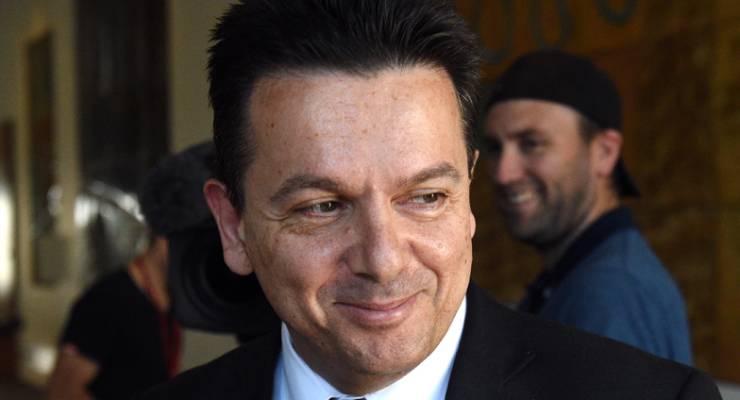
Despite the hand-wringing from many business leaders and conservative commentators, the Senate is set to actually save the government tens of billions of dollars. Indeed, it is likely that a diverse Senate will be more concerned with the budget bottom line than the pre-election Liberal strategists were. While an eight-week election campaign was not enough to force an answer out of the Coalition about how their $48 billion tax cuts would be funded, no doubt an eight-day Senate inquiry inevitably will.
Last week, credit rating agencies rushed to make a judgement on the election before the results were even known. But this arrogance — from the very same agencies that certified the stability of the banks that crashed and caused the GFC, meant a much bigger point was missed. When it comes to the revenue side of the budget, many of the crossbench parties, Labor and the Greens come bearing cash.
[Morrison can run but can’t hide from S&P]
Analysis from Australia Institute released today on the likely fate in the Senate of key Turnbull government policies — and the budget impact of these policies — finds there is at least $100 billion worth of revenue gains to be made with the support of Labor and new crossbenchers.
Business leaders and the ratings agencies should be urging the government to work with, rather than against, the new Senate on key revenue matters.
The key choice for Malcolm Turnbull is whether or not he will repeat the populist mistake made by Tony Abbott. On taking office, Abbott prioritised the passage of the tax cuts he had foreshadowed ahead of introducing the spending cuts that he had kept up his sleeve. Abbott bet, wrongly, that the Senate would have no choice but to pass the unpopular spending cuts after they had passed his popular tax cuts. He was wrong, and the Coalition’s economic credibility is yet to recover.
[Are conservatives better economic managers?]
Abbott’s repeal of the carbon price and his retention of the compensation measures cost the budget around $7 billion per year. He then blamed the Senate for failing to pass big cuts to health and education that he had promised not to make. If Turnbull wants to restore the Coalition’s credibility when it comes to managing the budget and show that he can make an “unworkable” Parliament work, he will need to tackle the revenue side of the budget first. Luckily for him the Senate looks willing.
Bringing forward legislation to increase the tax on the superannuation of the very wealthy and abandoning the unpopular proposal to cut tax for big business will boost both the budget bottom line and the Prime Minister’s authority. Delivering promised reform and avoiding inevitable defeat will deliver more for his government, and the economy, than chest-beating and blaming the crossbench.
Successful governments work with the Senate, not against it. The constitution made it deliberately hard to pass laws. This is not chaos; it actually provides stability.
The new Senate is obviously complicated, but bringing on revenue measures, while abandoning other expensive measures like the company tax cuts, could lead to workable and positive economic outcomes.
The $100 billion of revenue gain identified by the Australia Institute is just the beginning for a government that is determined not to just repair the budget but also repair the public’s faith that political parties can work together when they share similar ideas. The government should embrace Labor’s capital gains tax policy, for example, a policy even the BCA supports, and he could significantly reduce the deficit or spend new money to prove the sincerity of his commitment to Medicare. Such reform to capital gains tax is widely supported by economists and was recommended by the Henry tax review.
[Company tax: the Four Rentseekers sing a song of bullshit]
On the spending front, cuts to renewable energy or Gonksi education spending are likely to face a chilly reception in both the community and in the Senate.
If government genuinely wants more “jaw-jaw and less war-war”, as Arthur Sinodinos said yesterday, other Coalition positions need to be abandoned. Further changes to the Clean Energy Finance Corporation or cuts to renewable funding or attacks on environment groups would likely only enrage key parts of the Senate. It would seem wise to abandon these unpopular and largely ideological legacies from the Abbott period.
Our research shows plenty of potential common ground in the new Senate but also reveals a number of policies that are unlikely to pass the upper house. A smart new Turnbull government would recognise this early and adapt. Tony Abbott chose instead to charge full steam ahead. Time will tell if Turnbull is really more agile than his predecessor.







Crikey is committed to hosting lively discussions. Help us keep the conversation useful, interesting and welcoming. We aim to publish comments quickly in the interest of promoting robust conversation, but we’re a small team and we deploy filters to protect against legal risk. Occasionally your comment may be held up while we review, but we’re working as fast as we can to keep the conversation rolling.
The Crikey comment section is members-only content. Please subscribe to leave a comment.
The Crikey comment section is members-only content. Please login to leave a comment.